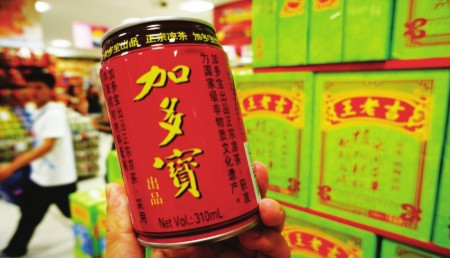China's Herbal Tea War Continues As Two Companies Fight Over Packaging And Consumer Perception
The latest in China’s herbal tea war between private vs. state-owned enterprises: state-owned Guangzhou Pharmaceutical Holdings, Ltd., may have gotten the Wanglaoji brand back, but consumers have complained about the taste of the new herbal tea.
Wanglaoji herbal tea is the largest canned drink brand in China, ahead of The Coca-Cola Company (NYSE:KO), with a 13.72 percent share of the bottled beverage market.

The trademark is technically owned by Guangzhou Pharmaceutical Holdings, but privately-owned Jiaduobao Beverage Co., Ltd., licensed the right to the Wanglaoji trademark in 1995 and has since made the formerly marginalized drink enormously popular in China.
Even though Jiaduobao purchased the right to use the brand name until 2020, in 2005 it was discovered that the company may have obtained the trademark though bribes, casting doubt on whether it can legally use the brand. In 2011, Guangzhou Pharmaceutical formally submitted a request for the brand name to be returned.
In 2012, in an arbitration conducted by the China International Economic and Trade Commission, the right to the Wanglaoji trademark was returned to Guangzhou Pharmaceutical, which began to sell its tea in its famous red cans, designed and popularized by Jiaduobao, in June of 2012.
Jiaduobao, not to be deterred, repackaged its product. Its tea is now sold in similar red cans bearing the Jiaduobao name, instead of the famous Wanglaoji. The red can packaging is currently under contention.
Guangzhou Pharmaceutical has been directing its advertising efforts toward reassuring consumers that it is the original owner of the herbal tea recipe, and what it produces is the real deal.
However, Guangzhou Pharmaceutical may not have won the hearts of Wanglaoji consumers. A number of customers complained that the new Wanglaoji tea doesn't taste like it used to.
One consumer, identified by his last name of Liu, purchased a case of Wanglaoji herbal tea produced by Guangzhou Pharmaceutical in February, according to Caijing, a major Chinese financial news site. The packaging looked exactly like the Wanglaoji produced by Jiaduobao before, bearing the slogan “185 years of the real Wanglaoji recipe has never changed.”
Liu found that the herbal tea tastes completely different than before, and he sued Guangzhou Pharmaceutical in April in Shangdong province.
Another consumer, a woman whose last name is Wu, purchased a case of the new Wanglaoji in April, and she too found the taste and texture to be completely different from how it tasted in the past. She submitted a case against Guangzhou Pharmaceutical in the northeastern city of Shenyang, Caijing reported, as a result.
© Copyright IBTimes 2024. All rights reserved.





















